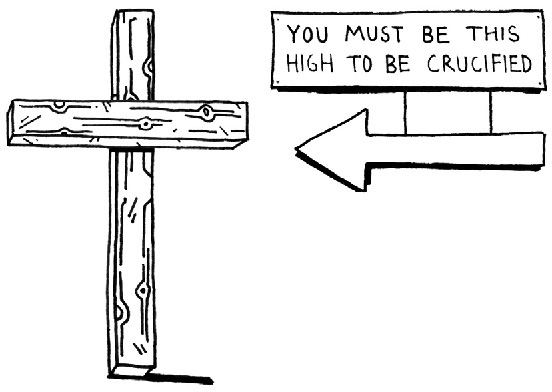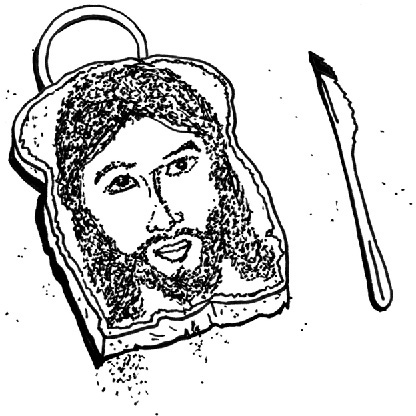

EASTER▶
Bunnies were banned for Easter.
Pets at Home, Britain’s biggest pet retailer, announced it wouldn’t be selling any rabbits between Good Friday and Easter Monday because so many of them are abandoned every year in the subsequent weeks. It seems that people infected by the Easter imagery buy bunnies on impulse and then are unable to look after them; shelters take in 67,000 abandoned rabbits each year.
In Manchester, organisers of a performance of an Easter passion play* tried to fund it by offering to crucify people in exchange for money. Their crowdfunding page declared that for £750, donors could get ‘the full crucifixion experience’ – which, it transpired, would have involved hoisting them on to a cross for a few minutes then lowering them back down again. The idea was shelved after Reverend Canon Falak Sher, chairman of the play’s organising committee, got wind of it and argued that it was blasphemous, dangerous and – perhaps most importantly – very tasteless.

Meanwhile, an off-licence in Ireland started selling Buckfast Easter eggs this year, packaging up chocolate eggs with a bottle of the notorious tonic wine. The Devon-based monks who make Buckfast Tonic Wine advised people against buying the boxes, arguing they might encourage children to drink. Ironically, despite being made by monks, Buckfast has an ungodly reputation in Scotland, where the vast majority of it is consumed. A 2009 report found that 43 per cent of Scottish prisoners had drunk Buckfast just before committing their last offence, even though it accounts for only 1 per cent of Scotland’s overall alcohol sales.
EBAY▶
eBay users sold Cheetos shaped like laser guns, Bart Simpson, the Virgin Mary and penises. Lots of penises.
The craze for selling snacks that look like something else began in February, when a Cheeto resembling Harambe the gorilla (killed at Cincinnati Zoo in 2016) appeared to have been sold for $99,900. In fact, the buyer pulled out before completing the transaction, but that part of the story didn’t reach a lot of people, so they searched through their snack packets hoping to strike Harambe-shaped gold. Over the following months, many more Harambe-shaped Cheetos came on sale, along with snacks shaped like all sorts of other objects. For some reason, Cheetos seem to lend themselves to looking like penises.
Odd-shaped Cheetos weren’t the weirdest things on sale on eBay this year. Someone bid more than $1,500 for a bag of air from an Adele concert; a slice of toast with an image of Jesus was listed at $25,000; a 14cm-long bran flake was listed on the British site at £1,000; and a mouldy sandwich that looked like Mickey Mouse was on sale for $30,000.

ECUADOR▶
Ecuador elected as president the author of a joke book entitled World’s Best Jokes.
Lenín Moreno believes that laughter can help the body to heal. And it isn’t the only book he wrote on the subject: as vice president he was the author of another called Being Happy Is Easy and Fun.
His narrow victory in this year’s election makes Moreno the world’s first paraplegic head of state. He says that his disability helps him as a politician: ‘When you don’t have legs, you look down. That’s what I learned: that there’s another life, another existence, that there are other human beings that need a lot from us. For me, this is a novel experience that I thank God for.’
ELECTIONS, GENERAL▶
For an election in a country that doesn’t exist, see Abkhazia; for a footballer of the year turned president, see Bulgaria; for a country that voted by marble, see Gambia; for a party with a milk packet as its logo, see Kenya; for a president who claimed victory a month before voting opened, see Rwanda; for a president called Mr Cheese from Buffalo, see Somalia; for a singing dentist turned president, see Turkmenistan; for a corpse becoming president, see Zimbabwe.
For General Elections, see UK General Election.
ENERGY▶
The Kentucky Coal Mining Museum converted to solar power.
The museum, which celebrates all things coal, installed 80 solar panels on its roof, hoping to save up to $10,000 a year. The man who installed the solar panels said he was surprised to get the job, saying, ‘I was like, are you for real?’, while the museum’s communications director, Brandon Robinson, admitted to reporters that ‘It is a little ironic.’
Meanwhile, in Britain, a windy couple of weeks in June made the the country’s wind turbines so productive that there was little need for coal-powered electricity. However, because it costs so much to turn coal power stations on and off, they were all kept online, and people were actually paid to take electricity for a short while, meaning that their final energy bills were lower than they would otherwise have been. Earlier in the year, the UK went a full day without needing any energy at all from its coal power stations for the first time since 1882. This was partly due to low electricity demand after the Easter holidays, and again, a few particularly windy days.
Also cashing in on the breezy conditions, a British firm is planning a massive wind farm to be powered by giant kites flying higher than London’s Shard building. As they pull at a tether, they will generate power by rotating a drum on the ground.
In Germany, scientists built what they called the ‘world’s largest artificial sun’: effectively 149 film-projector spotlights that can produce light 10,000 times as intense as the sun. When all the lamps are swivelled to point at a single spot, temperatures of up to 3,500°C can be generated. It is hoped that such power will one day produce hydrogen fuel. The project manager, Kai Wieghardt, said, ‘I had tears in my eyes today. It’s my baby.’
ESPIONAGE▶
China offered a cash prize to catch spies.
In April, Beijing’s government promised 500,000 yuan (about £60,000) to anyone who could expose a foreign agent. And in what state media described as an attempt to mobilise young people into ‘a huge, counter-spy force’, publishers inserted a game called ‘Find the Spy’ into school textbooks.
While China was recruiting child spies, German children were allegedly being spied on. The My Friend Cayla toy doll was classified as ‘illegal espionage apparatus’ and banned. Cayla responds to user’s questions by accessing the Internet via a bluetooth connection embedded in her body. A German government watchdog ruled the connection could be hacked and used to eavesdrop on, and speak directly to, the user via the doll’s microphone system.
Even more surprising than a children’s doll, the late Richard Whiteley – former host of Channel 4’s Countdown – was accused of top-level espionage. Ricky Tomlinson, star of The Royle Family, alleged that Whiteley worked for the intelligence services in the 1970s, when he was involved in a plot to jail Tomlinson and other trade unionists. Whiteley’s partner insisted the allegations were nonsense, not least because he was terrible with technology and ‘very indiscreet’.

EVEREST▶
Climbing Everest may have got easier: by nearly one inch.
Indian scientists mounted an expedition to see whether an earthquake in 2015 had taken an inch off the height of Mount Everest. The potential height reduction may be good news for tired climbers, but the bad news is that tectonic plate movement makes Everest (and the rest of the Himalayas) 3–4 millimetres taller each year – so even if it has lost it, Everest will be back to its old height by about 2022.
In May, Indian mountaineer Anshu Jamsenpa became the first woman to climb Everest twice within a week. A week later, 29-year-old Spanish mountaineer Kilian Jornet Burgada also climbed Everest twice within a week, without oxygen, and while suffering food poisoning. He modestly said it was ‘a mountain like any other – albeit taller’.
Unfortunately, the less dedicated have now started cheating their way up Everest. Last year an Indian couple photoshopped their faces on to someone else’s photo from the summit, to trick the Nepal authorities into giving them their official Everest completion certificate. They were banned from climbing mountains in Nepal for 10 years. The authorities are now considering giving GPS belts to climbers to track whether or not they’ve told the truth about their ascent.
The downside of all the people climbing Everest (at least, those who do actually climb it) is the huge mountain of litter they leave behind. So much rubbish, like abandoned tents and supplies, has been left on the mountain that this year the Nepalese government had to recruit sherpas to fill huge canvas bags with 80 kilos of waste each. They were then taken by the ‘bin men’ – helicopter pilots – who winched it away. The Sherpas received a bonus of $2 for every kilo of rubbish they brought back to camp.
EXCUSES▶
To find out why an alt-right commentator forgot basic information about his children, see Divorce; why some employers don’t pay their staff fairly, see HMRC; why the residents of Nashville were late for work, see Mayors; why a ‘thunder master’ lost a fight in 10 seconds, see Martial Arts; why Kentish commuters were delayed, see Railways; why almost 900,000 litres of alcohol mysteriously went missing, see Rats; and why a real-life Jaws made someone late for dinner, see Shark Attack.
EXTINCTIONS▶
If the Chicxulub asteroid had hit the Earth 30 seconds later, we’d all still be speaking dinosaur.

Chicxulub was the asteroid that landed in present-day Mexico 66 million years ago and obliterated the dinosaurs. Theoretically, it shouldn’t have been able to do so – it was only 9 miles across, the equivalent of a grain of sand hitting a bowling ball. But this year, geologists finally worked out how it caused such devastation: it hit the Earth in ‘the worst possible place’.
Scientists drilled into the crater where the asteroid struck, and found that the rock there was full of sulphur. At the moment of impact, this would have vaporised, exploded upwards and turned into a cloud that reflected all the sun’s heat back into space, cooling the Earth to temperatures dinosaurs couldn’t handle. Since the asteroid struck at 40,000mph, matter from the Earth’s crust would have flown higher than the Himalayas, and a 10,000°C fireball would have formed and incinerated everything within 600 miles. It would also have made a hole 111 miles wide and turned the surrounding sea into steam. Had Chicxulub arrived 30 seconds later, it would have met the Earth at a different point in its rotation, avoiding that sulphur-filled spot, and the dinosaurs might still rule today.